Lesson Fifteen
Dialogue fifteen: Public transportation
L: daa gáaDay khaar ta zee? Is this vehicle going to the city? | دا ګاډے ښار ته ځى؟ |
H: na, nu zee. No it's not going. | نه، نۀ ځى. |
L: du khaar gáaDay du kum zaay na zee? Where does the city bus go from? | د ښار ګاډے د کُوم ځائ نه ځى؟ |
H: oogora! du khaar gáaDay hálta oodrégee. Look! The city bus stops over there. | وګوره! د ښار ګاډے هلته ودرېږى. |
L: bakhkhana ghwáaRum, zu naabalád yim, Taawn ta kum gáaDay zee? Excuse me, I don't know my way around, which bus goes to Town? | بخښنه غواړم، زۀ نا بلد يم، ټاون ته کُوم ګاډے ځى؟ |
H: dălta óodrega, yo tso minTa pas ba ráashee. Stand here, it will come in a few minutes. | دلته ودرېږه، يوڅو منټه پس به راشى. |
L: kha, mirabaanee. OK, thanks. | ښه، مِهربانى. |
L: kháara póre tsóomra karaaya da? How many rupees is it to the city? | ښاره پورې څومره کرايه ده؟ |
H: sirf shil roopúy. Only twenty rupees. | صرف شل روپۍ. |
L: ku Taksée ke kénum no tso roopúy ba waakhlee? If I go in a taxi, how much will it cost? | کۀ ټکسی کښې کښېنم نو څو روپۍ به واخلى؟ |
H: atiyáa roopúy Eighty rupees. | اتيا روپۍ. |
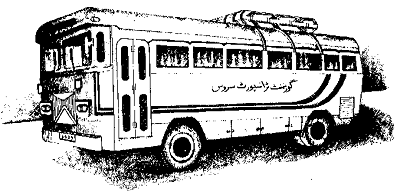
👆 Men: Spend a day riding around on public transport in your area. Listen for the names of destinations called out by conductors. Work out the routes. Later, confirm your findings with your helper.
👆 Ladies: This week become an expert on rickshaws or whatever transport is appropriate for you where you are. Learn the names of the useful landmarks and roads that rickshaw drivers know for directions.
NOTE:
Like many English loan words, the Pukhto word for “minute” is not uniform. Different speakers use it in a variety of forms.
Pronunciation drill

👆 How are you doing at remembering and pronouncing the names of your new friends correctly? Here are some common names to practice with your helper. Knowing the meanings may help you remember them too.
- Ladies’ names:
| gUlnaar begum | ګلنار بېګم |
| gUlnáaz | ګُلناز |
| gUl tsaanga | ګُل څانګه |
| chaman gUl | چمن ګُل |
| shabnam | شبنم |
| shama | شمع |
| noor jahaan | نُورجهان |
| noreen gUl | نورين ګُل |
| naseem begum | نسيم بېګم |
| shameem akhtar | شميم اختر |
| sakeena | سکينه |
| salmaa | سلمى |
| saaliha | صالحه |
| taa`ira | طائره |
| saa`ira | سائره |
| saajida | ساجده |
| baagh aaraam | باغ آرام |
| raabiya | رابعه |
| parween | پروين |
| qamro jaan | قمروجان |
| kalsóom | کلثوم |
| sa'ida | سعيده |
| sherbaano | شېربانو |
| zeenat | زينت |
| zaahida | زاهِده |
| rUkhsaana | رُخسانه |
| farkhanda | فرخنده |
| beebee fozia | بى بى فوزيه |
| beebee rUqaia | بى بى رقيه |
| bakhtawura | بختوره |
| beebee | بى بى |
| beebee taa`ira | بى بى طائره |
| haleema beebee | حليمه بى بى |
| khUdija beebee | خديجه بى بى |
| beebee faatima | بى بى فاطمه |
| maryam naaz | مريم ناز |
| sUltaana | سُلطانه |
| haajira | هاجِره |
| dilshaad | دلشاد |
| taaj mahal | تاج محل |
| bakht taaja | بخت تاجه |
| taaj begum | تاج بېګم |
| khandaana | خندانه |
| jameela | جميله |
| jahaan aaraa | جېهان آرا |
| bakht zaiba | بخت زيبا |
| noor mahal | نُور محل |
| rehaana | رېحانه |
| saabra | صابره |
| saleema | سليمه |
| shabaana | شبانه |
| shagUfta | شګُفته |
| faree zaada | فرى زاده |
| badree jamaala | بدرى جماله |
| jaam sheereen | جامِ شيرين |
| yaasmeen | ياسمين |
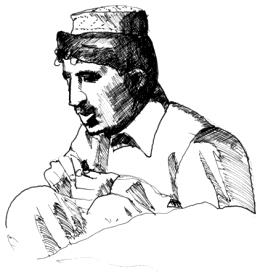
- Men’s names:
| zuRawar khaan | زړور خان |
| abdul walee | عبدالولى |
| imtiyaaz ahmad | اِمتياز احمد |
| fazl-i-khaaliq | فضل خالِق |
| ziyaarat gUl | زيارت ګُل |
| taaza gUl | تازه ګُل |
| jUma gUl | جُمعه ګُل |
| hazrat hUsayn | حضرت حسين |
| habeeb-Ur-rahmaan | حبيب الرحمان |
| jaabir khaan | جابِرخان |
| faqeer khaan | فقير خان |
| gUlaab gUl | ګلاب ګُل |
| khaaysta rahmaan | خائسته رحمان |
| khoorsheed | خورشید |
| mUhamad rafeeq | محمد رفيق |
| saadiq | صادِق |
| yaaqoob | يعقوب |
| yoonas | يُونس |
| zahoor | ظهور |
| daawUd | داؤد |
| taahir | طاهر |
| itbaar gUl | اعتبار ګُل |
| eenzar gUl | اينځر ګُل |
| khaan zaada | خان زاده |
| gUl zaada | ګُل زاده |
| gUl farosh | ګُل فروش |
| miyaan said kareem | مياه سيد کریم |
| khaan nawaab | خان نواب |
| khaan badur | خان بهادر |
| miyaan said alee | مياه سيد على |
| bahroz | بهروز |
| dildaar shaah | دِلدار شاه |
| ameer jaan | امير جان |
| jaanbaaz | جانباز |
| bihraam khaan | بهرام خان |
| dolat khaan | دولت خان |
| akbar khaan | اکبر خان |
| zaahid | زاهِد |
| fazal hUsayn | فضل حسين |
| fazl-i-waahid | فضل واحد |
| shaahidUllah | شاهدالله |
| kareemUllah | کريم الله |
| zafan alee | ظفر على |
| saidUllah | سيد الله |
| abdUlghafoor | عبدُالغفور |
| jamaalUdeen | جماالدين |
| sardaar alee | سردار على |
| abdUlqeyUm | عبدالقيوم |
| abdUlqabeer | عبدالکبير |
| abdUlbaaqee | عبدالباقى |
| Umar hayaat | عُمر حيات |
| ihsaan ilaahee | احسان الٰهى |
| fakhrUdeen | فخرالدين |
| ghaazee | غازى |
| qaazee | قاضى |
| qamar deen | قمر دين |
| abdUrrasheed | عبدالرشيد |
| kareem bakhash | کريم بخش |
| khUdaa bakhash | خُدا بخش |
| bakht baydaar | بخت بيدار |
The future tense
There are two forms of the future tense, each with a slightly different meaning. In everyday speech the difference is often ignored and the distinction is made by intonation of voice rather than verb forms.
1. Imperfective
This implies a continuous action: 'I will be going, seeing, finishing’, etc.
به - ba + Present Form = Imperfective Future
The imperfective (strong) future uses the present form of the verb and and adds the particle به - ba. For example,
| zu ba haghá sabáa wéenum | I will be seeing him tomorrow. | زۀ به هغه صبا وينم. |
| tu ba sabaa chărta ze? | Where will be you going tomorrow? | تۀ به صبا چرته ځې؟ |
| zu ba du khpul dost kara zum. | I will be going to my friend's house. | زۀ به د خپل دوست کره ځم. |
| day ba nun shpa kaar kawee? | Will he be working tonight? | دے به نن شپه کار کوى؟ |
| aw, nun shpa ba kaar kawee. | Yes, he will be working tonight. | او، نن شپه به کار کوى. |
2. Perfective
In the perfective future tense the action is delimited or complete, that is, it is of short duration. The perfective future also can give a verb a weaker or less definite feel.
به - ba + Subjunctive Form = Perfective Futurue
The perfective future is made by using the subjunctive form of the verb and adding the particle به - ba. For example, notice the difference between the regular present and subjunctive forms of these verbs:
| Verb | Present / Imperfective | Subjunctive / Perfective |
|---|---|---|
leedúl to see لیدل | wéenum I see وینم | óoweenum ...I'll see (subjunct.) ووينم |
wahúl to hit وهل | wahúm I hit وهم | óowahum ...I'll hit (subjunct.) ووهم |
Now let’s make some sentences with the perfective future. (به - ba + subjunctive)
| zu ba haghá óoweenum. | I will see him. | زۀ به هغه ووينم. |
| zu ba haghá óowahum. | I will hit him. | زۀ به هغه ووهم. |
Transitive verbs in the perfective future
As we saw above, most regular (non-compound / non-seperable) verbs add a و - oo / w to the beginning in the subjunctive form and put the emphasis on the first syllable.
| tu ba nun shpa khatoona ooleeke? | Will you write letters tonight? | تۀ به نن شپه خطُونه وليکې؟ |
| aw, begaala ba ye ooleekum. | Yes, I will write them tonight. | او، بېګاله به يې وليکم. |
| day ba sakhkáal ghunúm óokaree? | Will he sow wheat this year? | دے به سخکال غنم وکرى؟ |
| pu de hafta ke ba haghá óoweene? | Will you see him this week? | په دې هفته کښې به هغه ووينې؟ |
| aw, óo-ba-ye-weenum. | Yes, I will see him. | او، وبه يې وينم. |
| kala ba wărta khat óolege? | When will you send him the letter? | کله به ورته خط ولېږې؟ |
| sabaa ba wărta oolegum. | I will send the letter tomorrow. | صبا به ورته ولېږم. |
| nun ba kapRe óoweenze? | Will you wash clothes today? | نن به کپړې ووينځې؟ |
| na, nun ba oo-nú-weenzum. | No, I will not wash them today. | نه، نن به ونۀ وينځم. |
| zu ba yo saRay óotakhtawum. | I will kidnap one man. | زۀ به يو سړے وتښتوم. |
| zu ba staa grewaan ooshlawum. | I will tear your shirt. | زۀ به ستا ګرېوان وشلوم. |
| zu ba daa lóba óogaTum. | I will win this match. | زۀ به دا لوبه وګټم. |
| taaso ba daa lóba oo-nú-gaTey. | You will not win the match. | تاسو به دا لوبه ونۀ ګټئ. |
| khor ba me or oolugawee. | My sister will light the fire. | خور به مې اور ولګوى. |
NOTE:
The خ - kh is sometimes not pronounced, hence sakaal.
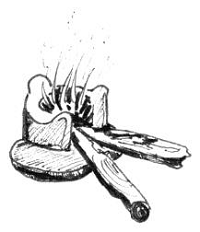
In everyday speech the و - oo prefix is sometimes dropped from sentences, this is especially so in the negative. For example,
Some transitive verbrs that take the ـو - -oo / -w prefix:
| astawúl | to send | استول |
| balúl | to invite | بلل |
| bayawúl | to make flow | بهېول |
| paRsawúl | to inflate | پړسول |
| pRaqawúl | to make shiny | پړقول |
| tukhtawúl | to kidnap | تښتول |
| zghalawúl | to chase | ځغلول |
| zwaRandawúl | to hange | ځوړندول |
| chulawúl | to drive | چلول |
| raabalúl | to send for | رابلل |
| raastawúl | to send (from here) | راستول |
| rapawúl | to (cause to) shake | رپول |
| raswúl | to deliver | رسول |
| rghaRawúl | to roll up | رغړول |
| shărmawúl | to humiliate | شرمول |
| shilawúl | to tear | شلول |
| ghokhtúl | to want | غوښتل |
| katúl | to look at (present root ګور-) | کتل |
| karúl | to sow | کرل |
| gaTúl | to gain | ګټل |
| gurzawúl | to take someone for a walk | ګرځول |
| lugawúl | to turn on | لګول |
| leedúl | to see (present root وین-) | ليدل |
| legúl | to send | لېږل |
| leekúl | to write | ليکل |
| lostúl | to read | لوستل |
| weenzúl | to wash | وينځل |
| yashawúl | to boil | يشول |
NOTE:
The verbs رابلل - raa-balúl and راستول - raastawúl are formed from بلل - balúl and استول - astawul with an added را - raa on front. The ـو - -oo prefix gets attached after the را - raa. For example, راوبلم - raa-oo-balum or راواستوم - raa-waastawum.
Intransitive verbs in the perfective future tense
Here are some intransitive verbs that take the و - oo / w prefix.
| paRsedúl | to swell (up) | پړسېدل |
| pRaqedúl | to shine | پړقېدل |
| tukhtedúl | to run away | تښتېدل |
| tsatsedúl | to drip | څڅېدل |
| khatúl | to climb (present root خېژ-) | ختل |
| khwazedúl | to move | خوځېدل |
| khwaredúl | to be scattered | خورېدل |
| rapedúl | to shake | رپېدل |
| rasedúl | to arrive | رسېدل |
| irghaRedúl | to roll along | رغړېدل |
| zghaledúl | to move | زغلېدل |
| shărmedúl | to be shy | شرمېدل |
| ghwaRedúl | to be spread | غوړېدل |
| kaRedúl | to be troubled | کړېدل |
| gurzedúl | to walk | ګرځېدل |
| laRzedúl | to tremble | لړزېدل |
| lugedúl | to touch | لګېدل |
| naRedúl | to tumble down | نړېدل |
| yishedúl | to be boiled | يشېدل |
Example sentences:
| zmaa kheTa ba oo-paRsegee. | My stomach will swell up. | زما خېټه به وپړسېږى. |
| zmoong chut kacha day aw pu baaraan ke ba óo-tsaatsee. | Our roof is poor quality and will leak in the rain. | زمُونږ چت کچه دے او په باران کښې به وڅاڅى. |
| hágha tseez che safaa shee, no oo-ba pRaqégee. | The thing that is clean will shine. | هغه څيز چې صفا شى، نو وبه پړقېږى. |
👆 Make more sentences from the list of verbs above.
The verb کېدل - kedúl (to become) in the future tense
The verb کېدل - kedúl (to become) has an irregular subjunctive / perfective root form, شـ - sh- which never takes a و - oo prefix.
The subjunctive form of کېدل - kedúl (to become)
| singular | plural | |
|---|---|---|
1st | shum شم | shoo شُو |
2nd | she شې | shey شُئ |
3rd | shee شی | shee شی |
NOTE:
This verb is not to be confused with کېدل - kedúl (to happen) with _does_ take a و - oo prefix.
Just like with all other verbs, we use
- the present form + به - ba for an imperfective future, and
- the subjunctive form + به - ba for a perfective future.
For example contrast:
| Imperfective (Strong) | Perfective (Weak) |
|---|---|
ba khúfa kegee. She will be upset به خفه کېږی. | ba khúfa shee. She will be upset به خفه شی. |
Perfective future example sentences with کېدل - kedúl (to become) / کېدل - kedúl (to become) compounds:
| inshaal`laa, DakTúr ba she. | God willing, you will become a doctor. | انشاءالله، ډاکټر به شې. |
| inshaal`laa, shum ba. | God willing, I will. | انشاءالله، شم به. |
| haghwée ba zmoong na khúfa shee. | Will they become upset with us. | هغوى به زمُونږ نه خفه شى. |
| na, khúfa ba nu shee. | No, they won't get upset. | نه، خفه به نۀ شى. |
| táaso ba khosháala shey? | Will you be happy? | تاسو به خوشحاله شئ؟ |
| aw, khoshaala ba shoo | Yes, we will be happy. | او، خوشحاله به شو. |
| staa plaar ba joR shee? | Will your father be healed? | ستا پلار به جوړ شى؟ |
| aw, inshaal`la joR ba shee. | Yes, God willing he will be healed. | آو، انشاءالله جوړ به شى. |
| DoDúy ba oos pakhá shee? | Will the food be cooked now? | ډوډۍ به اوس پخه شى؟ |
| aw, pakhá ba shee. | Yes it will be cooked. | آو، پخه به شى. |
| chaay ba oos joRe shee? | Tea will be made now. | چائې به اوس جوړې شى. |
| zmaa niwe gaRúy ba pedáa shee? | Will my new watch be found? | زما نوې ګړۍ به پېدا شى؟ |
| mu-khufa kega, pedaa ba shee. | Don't be upset, it will be found. | مۀ خفه کېږه، پېدا به شى. |
| nun ba zmaa kapRé istrée shee? | Will my clothes be ironed today? | نن به زما کپړې اِسترى شى؟ |
| be ghúma sha! istrée ba shee. | Don't worry! They will be ironed. | بې غمه شه! اِسترى به شى. |
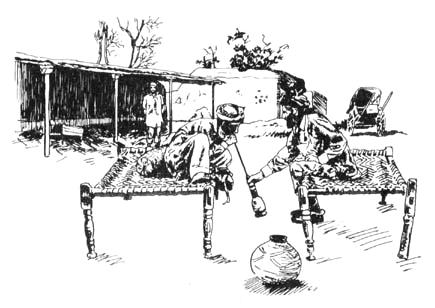
Intransitive compound verbs with کېدل - kedúl (to become)
As you can see in the exampels above, there are mamy compound verbs made using کېدل - kedúl (to become). Remember, there is no و - oo added to the subjunctive / perfective form of کېدل - kedúl (to become), so these verbs will never take a و - oo prefix.
Notice how in the present form the verbs get stuck in the infinitive and present forms if the first word ends in a consonant, but they always get broken up in the subjunctive form.
| Verb | Present / Imperfective | Subjunctive / Perfective |
|---|---|---|
oodú kedúl to go to sleep اُودهٔ کېدل | oodú kégee اُوده کېږی | oodú shee اُوده شی |
puTedúl to hide oneself پټېدل | puTégee پټېږی | puT shee پټ شی |
paydaa kedúl to be born پیدا کېدل | paydaa kegee پیدا کېږی | paydaa shee پیدا شی |
tayaaredúl to be(come) ready تيارېدل | tayaarégee تیارېږی | tayaar shee تیار شی |
rawaanedúl to start out روانېدل | rawaanégee روانېږی | rawaan shee روان شی |
khkaaredúl to apppear ښکارېدل | khkaarégee / khkaaree ښکارېږی / ښکاری | khkaara shee ښکاره شی |
koozedúl to get down کُوزېدل | koozégee کُوزېږی | kooz shee کُوز شی |
maatedúl to be broken ماتېدل | maatégee ماتېږی | maat shee مات شی |
maaloomedúl to be known معلومېدل | maaloomégee معلومېږی | maaloom shee معلوم شی |
pohedul to understand پوهېدل | pohégee پوهېږی | poha shee پوهه شی |
👆 Generate some future sentences with your helper using these verbs.
As with regular verbs, these intransitive کېدل - kedúl (to become) compound verbs carry slightly different meanings in the perfective (weak) and imperfective (strong) forms.
For example contrast the different uses of پوهېدل - pohedul:
| Imperfective (Strong) | Perfective (Weak) |
|---|---|
zu ba pohégum. I will understand. (Whenever you say it) زهٔ به بوهېږم. | zu ba póha shum. I may understand. (Some doubt) زهٔ به پوهه شم. |
The verb کول - kawul (to make) in the future tense.
The verb کول - kawul (to make) also has an irregular subjunctive / perfective root form, کړـ - kR- which also never takes a و - oo prefix. Often in spoken language the root کړـ - kR- is shortened to کـ - k- in speech (not in writing).
The subjunctive form of کول - kawúl (to make)
| singular | plural | |
|---|---|---|
1st | kRum / kum کړم / کم | kRoo / koo کړو / کو |
2nd | kRe / ke کړې / کې | kRey / key کړئ / کئ |
3rd | kRee / kee کړی / کی | kRee / kee کړی / کی |
Compound verbs with کول - kawul (to make)
There are many compounds made with کول - kawul (to make) in Pukhto. These compounds take an object and involve doing something to that object that changes it.
| Verb | Present / Imperfective | Subjunctive / Perfective |
|---|---|---|
pohawul to make understand پوهول | pohawée پوهوی | poha kRée پوهه کړی |
UlTúy kawul اُلټۍ کول | UlTúy kawee اُلټۍ کوی | UlTúy kRee اُلټۍ کړی |
oodu kawul to put to sleep اُودهٔ کول | oodu kawee اُوده کوی | oodu kRee اُوده کړی |
puTawul to hide / cause to hide پټول | puTawee پټوی | puT kRee پټ کړی |
joRawul to build, mend, cause to recover جوړول | joRawee جوړوی | joR kRee جوړ کړی |
maatawul to break (something) ماتول | maatawee ماتوی | maat kRee مات کړی |
| Imperfective | Perfective |
|---|---|
zu ba khpul taalibílum pohawúm. I will make my student understand (i.e. inform my student). زۀ به خپل طالبعلم پوهوم. | zu ba khpul sTooDánT póha kRum (kum). I will make my student understand. زۀ به خپل سټُوډنټ پوهه کړم (کم). |
Examples of compound verbs with کول - kawul (to make) in the future
| tu ba du maakhaam DoDúy du paara tsu paakhú ke? | What will you cook for dinner? | تۀ به د ماښام ډوډۍ د پاره څۀ پاخۀ کې؟ |
| keday she che daal paakhú kRum. | I might cook lentils. | کېدے شى چې دال پاخۀ کړم. |
| taaso ba maakhaam wrejze pakhé kRey? | Will you cook rice tonight? | تاسو به ماښام ورېژې پخې کړئ؟ |
| na, maakhaam ba nu pakhawoo. | No, we won't cook it tonight. | نه، ماښام به نۀ پخوُو. |
| pu de mosum ke ba haghá tsu khats kee? | What will he sell in this season? | په دې موسم کښې به هغه څۀ خرڅ کى؟ |
| pu de mosum ke ba aangóor aw aanáan khats kee. | He will sell grapes and pomegranates in this season. | په دې موسم کښې به انګُور او انار خرڅ کړى. |
| tarkáaN ba kala mez joR kee? | When will the carpenter build the table? | ترکاڼ به کله مېز جوړ کړى؟ |
| pu de haftá ba joR-nu-kee. | He won't make it this week. | په دې هفته کښې به جوړ نۀ کى. |
| kUrsúy ba kala joRa ke? | When will you fix the chair? | کُرسۍ به کله جوړه کې؟ |
| aawál ba daa kUrsúy joRa kRum, aw byaa ba staa kUrsúy jóRa kum. | First I will fix this chair, and then I will fix your chair. | اول به دا کُرسۍ جوړه کم، او بيا به ستا کُرسۍ جوړه کړم. |
| kala ba haghá khpul dookáan band kRee? | When will he close his shop? | کله به هغه خپل دُوکان بند کړى؟ |
| haghá ba aatú baje band kee. | He will close it at eight. | هغه به اتۀ بجې بند کړى. |
| kala ba akhbáar khatum kRe? | When will you finish the newspaper? | کله به اخبار ختم کړې؟ |
| lus minTa pas ba ye khátum kRum. | I will finish it after ten minutes. | لس مېنټه پس به يې ختم کړم. |
| tu ba kala kaar shUroo ke? | When will you be starting work? | تۀ به کله کار شروع کې؟ |
| dwawruze pas ba kaar shUróo kawum. | I will be starting work after two days. | دوه ورځې پس به کار شروع کوم. |
| kala ba daa kaar khilaas ke? | When will you be finishing this work? | کله به دا کار خلاص کې؟ |
| nun ba ye khilaas kum. | I will be finishing this today. | نن به يې خلاص کوم. |
NOTES:
- Verbal adjectives are inflected in agreement with the object.
- In the perfective form, the negative verbs prefix نهٔ - nu- precedes the verb stem کړـ - kR-:
{" "}
| zu ba war kooláaw kum. | I will open the door. | زۀ به ور کولاؤ کم. |
| zu ba war kooláaw nú-kum | I will not open the door. | زۀ به ور کولاؤ نۀ کم. |
The verb کول - kawul (to do) in the future tense.
The verb کول - kawul (to do), (not to be confused with the کول - kawul (to make) above) also has an irregular subjunctive / perfective root form, وکړـ - óokR- which always includes a و - oo prefix. Often in spoken language the root وکړـ - óokR- is shortened to وکـ - óok- in speech (not in writing).
The subjunctive form of کول - kawúl (to do)
| singular | plural | |
|---|---|---|
1st | óokRum / óokum وکړم / وکم | óokRoo / óokoo وکړو / وکو |
2nd | óokRe / óoke وکړې / وکې | óokRey / óokey وکړئ / وکئ |
3rd | óokRee / óokee وکړی / وکی | óokRee / óokee وکړی / وکی |
Compound verbs with کول - kawul (to do)
The verb کول - kawul (to do) is often used in compound verbs describing actions where the action being done is the object of the sentence.
This below chart may help you to understand the difference between the compounds with کول - kawul (to make) and the compounds with کول - kawul (to do)
| Compounds w/ کول (to make) | Compounds w/ کول (to do) |
|---|---|
Takes an outside object and does something that changes the object. (Makes the object ____ ) | The object is inside the compound itself. The object is an action that is performed. |
Never Takes a و - oo prefix in the perfective/subjunctive form. کړـ - kR- | Always Takes a و - oo prefix in the perfective/subjunctive form. وکړـ - óokR- |
Here are some examples of compound verbs with کول - kawul (to do)
| Verb | Present / Imperfective | Subjunctive / Perfective |
|---|---|---|
kaar kawul to work کار کول | kaar kawee کار کوی | kaar óokRee (óokee) کار وکړی (وکی) |
khabúre kawul to talk خبرې کول | khabúre kawee خبرې کوی | khabúre óokRee (óokee) خبرې وکړی (وکی) |
tapóos kawul to ask a question تپوس کول | tapóos kawee تپوس کول | tapóos óokRee (óokee) تپوس وکړی (وکی) |
The imperfective form can be used to show that an an action is limited and immediate, as in a one-off event. To show continous action, the (subjunctive based) perfective form.
| Imperfective | Perfective |
|---|---|
haghá ba nun shpa kaar kawee? Will he be working tonight? (As usual) هغه به نن شپه کار کوى؟ | haghá ba nun shpa kaar óokee? Will he work tonight? (This night only) هغه به نن شپه کار وکى؟ |
Examples of compound verbs with کول - kawul (to do)
| daa ba sakaal pu khaar ke kaar óokee? | Will she work in the city this year? | دا به سخکال په ښار کښې کار وکی؟ |
| aaw, óo-ba-kee. | Yes, she will. | آو، وبه کى. |
| zu ba staa plaar na tapóos óokum. | I will ask your father. (Lit. I will do a question from your father) | زۀ به ستا د پلار نه تپوس وک (وکم). |
| tsu wakht ba halta khabúre óoke? | What time will you speak there? | څۀ وخت به هلته خبرې وکې؟ |
| sabaa na, bulawruz ba hálta khabúre óokum. | I shall speak there the day after tomorrow. | صبا نه بله روځ به هلته خبرې وکم. |
The future progressive وی - wee
The equative verb (to be) in the future looks similar to it’s present form, except that all third person endings (دے - day, ده - da, and دی - dee) are replaced with وی - wee.
Also, وی - wee is used in a sentence without به - ba, it it signals an existing continuous or habitual state of a person or thing, for example, the weather every year at springtime.
| haghwée tsu wakht pu kúlee ke wee? | When are they usually in the village? | هغوى څۀ وخت په کلى کښې وى؟ |
| haghwée hechere pu kúlee ke nú-wee. | They are never in the village. | هغوى هېچرې په کلى کښې نۀ وى. |
| seb rozaana pu duftúr ke wee? | Is the boss in his office daily? | صېب روزانه په دفتر کښې وى؟ |
| aaw, du kaar pu wrázo ke rozaaná pu duftúr ke wee. | Yes, he is in the office on every work day. | آو، د کار په ورځو کښې روزانه په دفتر کښې وى. |
| pu sparlée ke mosúm tsunga wee? | What is the weather like during the spring? | په سپرلى کښې موسم څنګه وى؟ |
| pu sparlee ke nu garmee wee, nu yukhnée | In the spring, there is neither hot nor cold. | په سپرلى کښې نۀ ګرمى وى نۀ يخنى. |
| gUlóona ba sru wee? | Will the flowers be red? | ګُلُونه به سرۀ وى؟ |
| halukáan ba daa wakht pu gronD ke wee? | Will the boys be at the sports ground at this time? | هلکان به دا وخت په ګراونډ کښې وى؟ |
NOTES:
The و - w sound here is somewhere beween a / v / and / w /.
- به - ba is added to وی - wee to make the imperfective future tense.
Comprehension drill: Learning your way around
👆 Find a big map of your area. Take an imaginary trip with your finger, or give instructions for your helper to travel. Use the following words in your description, making complete sentences:
Towns in Khyber Pukhtunkhwa
Learn the names of the principal towns. Pay special attention to those “hard” sounds that occur in names like ملاکنډ - malaakánD
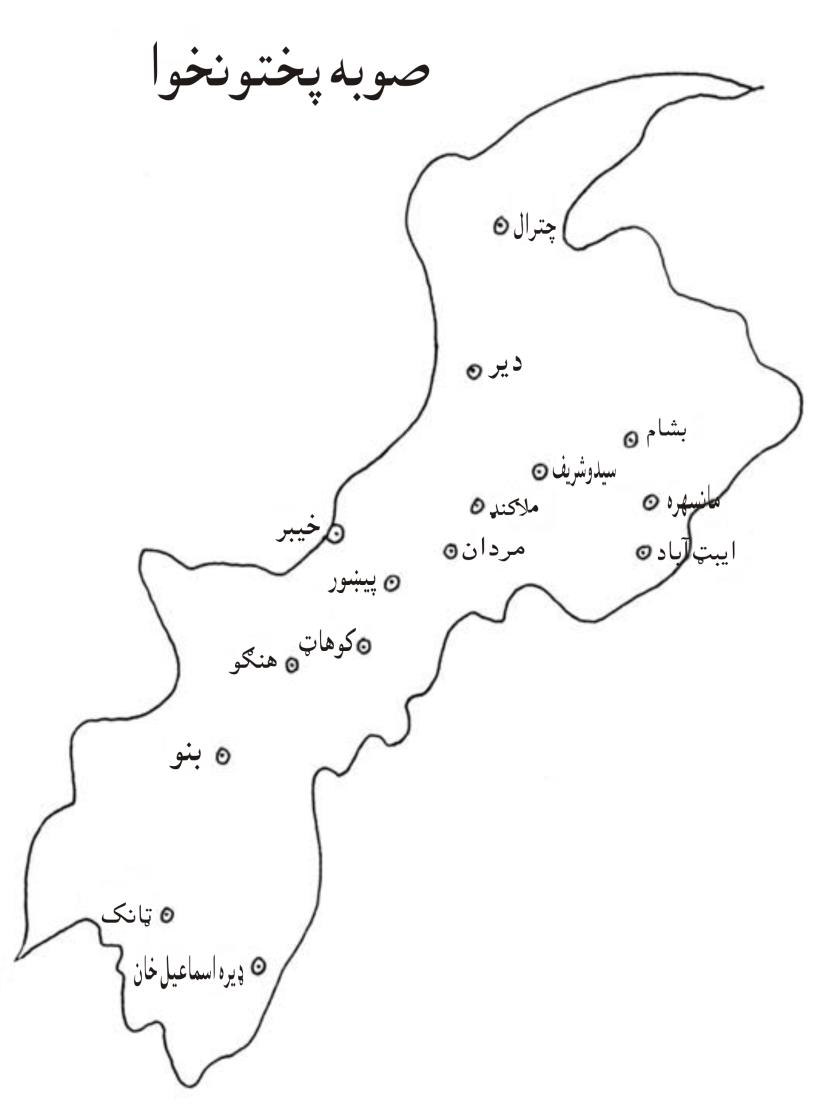
Memorising moment
mataloona
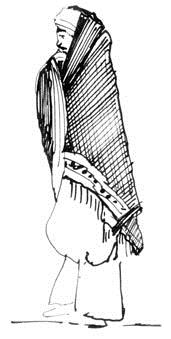
Rahman Baba
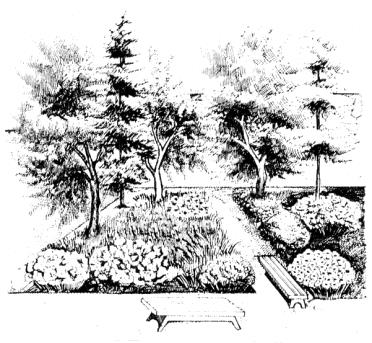
Exercises for Lesson Fifteen
- Change the following sentences into perfective future tense. For example:
| zu de ta begáala yo khat leekúm. | زۀ دې ته بېګاله يو خط ليکم. |
becomes
| zu ba de ta begáala yo khat óoleekum. | زۀ به دې ته بېګاله يو خط وليکم. |
- Answer the following questions in full sentences with negative responses.